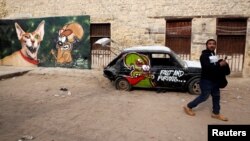On a winding road leading into Cairo's City of the Dead, a cartoon mouse with round ears and green eyes adorns the shop fronts and walls of the mausoleums where thousands of Egyptians live among the gravestones.
The path leads to a 15th-century complex built by Mameluk Sultan al-Ashraf Qaitbey, a UNESCO World Heritage Site that has been recently revived as a local artistic hub. In an adjacent courtyard where local boys play football, a mural shows Frankie the mouse putting a leash on a Pharaonic cat.
Contemporary art is bringing life and color into the once-drab necropolis, part of an ongoing project by Polish architect Agnieszka Dobrowolska called "Outside In: the Art of Inclusion."
"What we want to do is to bring together the old heritage, the traditions of this particular place, with creative contemporary art and with various cultural events to promote diversity. Old meets new, death and life come together in the city of the dead, where we can exchange ideas and culture between East and West," Dobrowolska told Reuters.
What began as a conservation project for the complex - which includes a mosque, a school and the remains of a drinking trough - grew into the initiative to invite artists from around the world to engage the community and create art inspired by the local culture. It is largely funded by the European Union.
Artists have so far come up with murals, mosaics, sculptures, graffiti and even live performances. Frankie the mouse is the work of a Polish graffiti artist who uses the pseudonym Franek Mysza.
‘Eccentric people’
"Those artists, in the eyes of the community, they're eccentric people who have come here to do something unusual. But when they work here in the street, there's a constant delivery of tea and homemade cakes because they work [outside], they involve children and they try to contribute in any way they can," Dobrowolska said.
One visiting British artist asked children to create clay objects they would like to take on a long journey. She displayed their snakes, crocodiles and cats alongside her own work.
Some families have lived in the necropolis, away from the bustle in Egypt's ancient capital of 20 million, for three or more generations. Residents include traditional artisans, whose work is sold in Cairo's Khan al-Khalili tourist market.
"[This art] is something new, and it's important for the children's development. Some of them accept it and some don't and just want to mess around, but none of them destroy it," said Mohamed El-Assal, a local shop owner.
Assal worked with a Dutch artist on a mural featuring stencils of the children's silhouettes.
Some residents said they hoped the art would lure tourists.
Tourism, a crucial source of income for Egypt, has struggled to rebound since the 2011 uprising ousted autocrat Hosni Mubarak, ushering in years of instability.
"They [the artists] came and offered to do this and said it would be good for tourism. They cleaned up the area and made it more beautiful," said Sameh, who owns a kiosk bearing a mural of Frankie the mouse. "I think that's a good thing."






